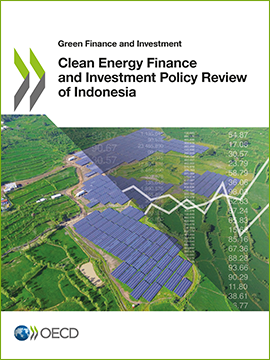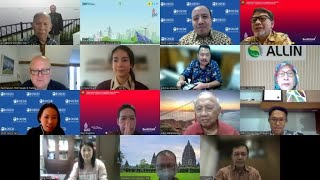Indonesia
Our work in Indonesia
The Clean Energy Finance and Investment Mobilisation (CEFIM) programme builds upon the OECD’s strong engagement with Indonesia and supports the country in unlocking finance and investment flows to achieve clean energy targets and sustainable finance goals. The programme draws on extensive stakeholder engagement and has provided tailored recommendations through the Clean Energy Finance and Investment Review of Indonesia, implementation-support activities and investor dialogues. It is complemented by regional peer-learning activities.
Following the recommendation of the Review to consider a more integrated approach to training programmes, CEFIM will co-organise a Clean Energy Finance and Investment training programme together with the Ministry of Energy and Mineral Resource's (MEMR) HR Development Agency, RE and EE Training, and the Financial Authority Services (OJK). Renewable energy and energy efficiency project developers, policymakers and financial institutions will participate in the training, which will be held annually over three years. In the final year, potential local trainers will be identified and trained to continue the programme.
News and events
- 2nd Indonesia Clean Energy Finance and Investment Training week summary report | Yogyakarta, Indonesia, 19-23 June 2023
- Focus Group Discussion I: Transition finance in Indonesia | 21 March 2023
- Energy Savings Insurance: first international focus group discussion | 14 March 2023
- Framework for industry’s net-zero transition: Indonesia country stakeholder meeting | 6 December 2022
- 1st Indonesia Clean Energy Finance and Investment Training week summary report | Bandung, Indonesia, 31 October - 4 November 2022
- Report: Assessing the progress of Indonesia's financial institutions towards the clean energy transition | 19 August 2022
- COP26 Indonesia Pavilion: Leading Climate Actions Together | 1-12 November 2021
- Commentary piece: RUPTL 2021-30 - PLN steps up ambitions to accelerate clean energy investments in Indonesia | 16 Nov 2021
Clean Energy Finance and Investment Policy Review
This first Clean Energy Finance and Investment Policy Review of Indonesia highlights actions needed to accelerate the pace of the clean energy transition and identifies opportunities for development partners to support Indonesia’s transition. The report provides a comprehensive overview of the current policy framework, highlighting progress and identifying untapped opportunities for strengthening policy interventions that can help scale up clean energy finance and investment. It also provides a number of tailored recommendations for the Government of Indonesia and development partners.

Indonesia's emissions trading system: Focus group discussions, November 2021 to May 2022
In order to assist the efforts of the Indonesian Government to develop a domestic emissions trading system (ETS), the OECD CEFIM, IEA and Indonesia’s Ministry of Energy and Mineral Resources hosted a series of four technical focus group discussions (FGD)s. Building on international experience and OECD/IEA experience, these FGDs provided a deep-dive into a variety of elements critical to the development of effective ETS schemes, each relevant to the Indonesian context. This series of FGDs brought together stakeholders from Indonesia and leading international experts to share their experience and lessons learned in the development, design and implementation of ETS. These events took place between November 2021 and May 2022.
FGD I examined Indonesia’s goals and early progress on the implementation of the ETS trial and different international approaches to designing and implementing ETS schemes in the power sector. During the discussion, country experts from China and Korea shared their respective countries’ experiences designing and implementing such schemes as well as key lessons learned.
FGD II looked at how other ETS schemes have addressed some early challenges in the design and implementation phase including determining the emissions cap, how the price will be determined and evolve, and the options of recycling the revenues raised from the scheme. Experts from the European Union, Poland and the United Kingdom shared their experience in technical design, monitoring ETS development and stimulating industry participation.
FGD III focused on implementation at the ETS pilot and early phases with a focus on design elements that can enhance participation. It also examined the impact of a carbon tax on the design and operation of the ETS. During the discussion, country experts from China, the United Kingdom and the European Union shared their insights as well as private sector perspectives on carbon tax versus ETS in carbon pricing policies.
FGD IV discussed regulation and the role of the financial sector in Indonesia’s emissions trading scheme and also looked at linkages to international carbon markets. The discussion included an overview of the Paris Agreement Rulebook as outlined under Article 6. During the discussion, country experts from South Africa, Japan, New Zealand and South Korea discussed together with different Indonesian government agencies their experience on linking with other carbon markets, including institutional arrangements, monitoring and verification systems, and certification of carbon offsets.
Each of the four FGDs ended with a dialogue, convening representatives from government institutions, development partners and other relevant stakeholders to discuss opportunities that could be adapted to the Indonesian context.
 |
- FGD I: Approaches to Emission Trading System (ETS) schemes in the power sector
- FGD II: Implementation and technical design elements of ETS schemes
- FGD III: Incentivising participation in voluntary phase of ETS scheme and impact of carbon tax on ETS
- FGD IV: Regulation and linkages to international carbon markets
Country overview
Market trends and outlooks
Energy market governance
Policy highlights
Sustainable finance
Financing instruments
Additional resources
- Launch of Indonesia's Green Taxonomy to support the Sustainable Finance Programme
- InvestIndonesia - investment guidance for Indonesia
- Lintas - information and investment services for new and renewable energy
- Geospatial renewable energy map
